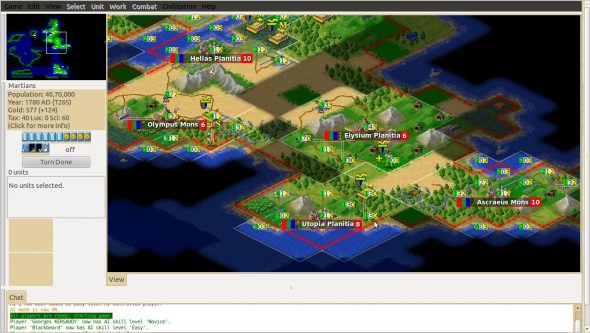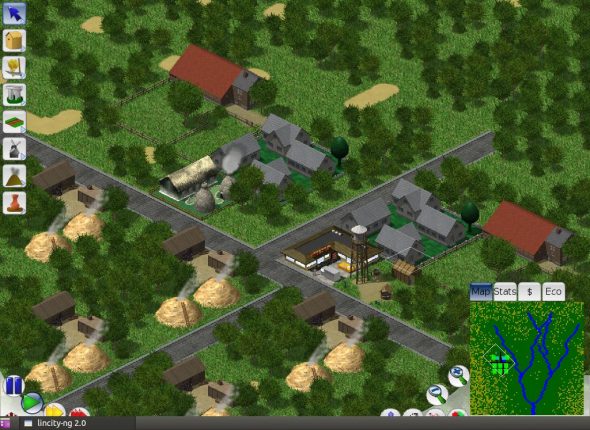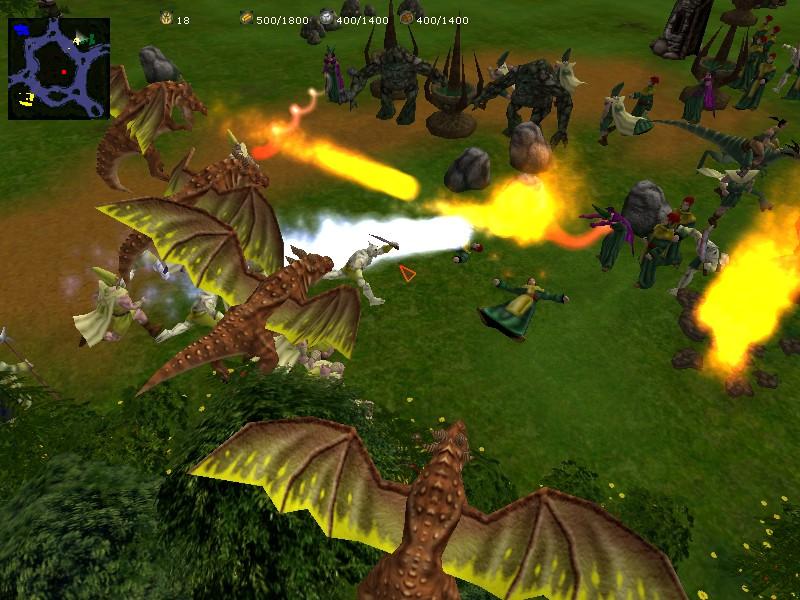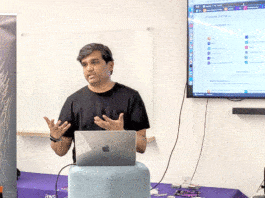GNU/Linux is not all work and no play. Not content with the creation of work software, the Free Software community has produced a rich selection of games, quite a few of which are as entertaining as their proprietary cousins.
Strategy games are perhaps the most imaginative and fun in the whole gaming repertoire. So are you new to strategy gaming? Fellow FOSS fan, just visualise chessmen on the board. Done? Now endow the chessmen with human life or magical powers. Put them into fantasy or historic story-lines. What you get is a strategy game. Just add a computer, and you get graphical effects to rival your own fertile imagination.
Allow such joys to unfold (after work) as you become a magician and put all comers to flame and sword in Glest. Populate the wild, wild American West and win independence from the British in FreeCol. Take the path of expansion and forge alliances or make war in FreeCiv. If peace, not war, gives you enjoyment, become an urban planner and tackle pollution to render your city idyllic, in LinCity. Here is entertainment that engages your capabilities to strategise. The best part is that all these brilliant games are free/libre software!
Pit magic against technology in Glest

Set in a medieval era, Glest pits the minions of magic against those of technology. Whichever side you take (the other is played by the computer, or you could play with others over the Web), you’ll stockpile gold, wood and stone, maintain stocks of grain at all times, and raise a host of foot soldiers and cavalry, with reserves of armour and even flying contraptions, demons and dragons. In Glest, the rhythm is: when you are not fighting, build fighters. Finishing off opponents is the only objective (does it have to be?).
As for battles, tactically position individual soldiers or groups of them. Reconnoitre locations, lay ambush, block paths, organise battlefronts and cripple your enemy in subsequent skirmishes. In the meanwhile, try and grow your force as fast as you can, though casualties will pile up. Choose armoured or mounted fighters over unarmed foot soldiers.
Glest is just complex enough to be enjoyable. Certain fighting units require certain buildings to function. These buildings need natural resources. Natural resources need miners. But hey, soldiers are needed, too, to defend the fort during mining. And you’ll always find yourself short of time in this arms race. So, you have multiple pressures on resources, personnel and time.
How do you balance infrastructure construction with army recruitment? That is where strategic thinking is called for. The capability to quickly build a large army and to strategise in battle should lead to a win. Mind you, the Glest AI is designed to be hard to beat. You’ll need to browse the Glest manual on wikia (see below) for tips and tricks.
Unlike turn-based strategy games, Glest works in real time. It will make you think fast. There is no respite in Glest, which feels like work sometimes. Ah, but if only building magical creatures was work…
Glest is recommended for fantasy and medieval history buffs. You will also appreciate Glest’s decent 3D graphics and its quality animations, which are somewhat rare in GNU/Linux. And this game is not only stable, but also fast.
A disclaimer: Glest reduces your screen resolution to 1024×768. So reset the resolution every time you quit the game. But what’s a minor irritant like that when it comes with so much entertainment?
This game’s on-board tutorials will teach you the game in half an hour. Extensions and addons are on Glest’s website. Most big distributions carry the game in their software repositories; Ubuntu does. With 2 GB of RAM and a dual-core processor, the game is snappy.
More than the final results of playing this game, you enjoy the sensations of a world where magic exists and you communicate with fantastic creatures. And you won’t have to use your imagination: instead, watch dragons in action on your screen. But Glest should have had a bigger and greater storyline. Strategy games have the potential to rival the experience of fantasy-genre books. Surely the fantasy genre is about more than magical creatures and rampaging around. It’s fun, but is that enough?
Conquer the world with FreeCiv

If you search around the Web for FreeCiv, you’ll read of FreeCiv addiction. Strategy buffs can’t quit before FreeCiv is finished, which may amount to three to eight hours (surely the Save Game concept is real?). Maybe that is because FreeCiv has you making so many micro-level decisions, that its heart-warming graphics, its gripping complexity and its rich storyline keep you hooked at every turn.
FreeCiv has a rich story. It is based on the history of man. FreeCiv rewards you for exploring your continent. Sometimes you find advanced technology through exploration of unknown places; you’ll find villages to annex to your kingdom; or gold and friendly mercenaries. On the other hand, you might disturb a village full of hostile pirates! Meanwhile, multiple things are taking place in your kingdom.
In FreeCiv, terrain is king. Choose your sites for cities with a strategic eye, to sustain a balance between food production and natural resources. The coastal cities are good for maritime trade, but vulnerable to invasion. Forested sites are fine for harvesting raw materials but not necessarily for food production.
The better the terrain, the quicker the population grows. A growing population lets you build more cities, which speeds up the rate of scientific development and military power. Expand your kingdom further by colonising uninhabited territories, raise garrisons, optimise infrastructure production in cities, change tax rates, construct the wonders of the world (which confer manifold military and technological advantages) like the Hanging Gardens, the pyramids, Leonardo’s workshop and Isaac Newton’s college; fund research in literacy, trade, metallurgy, mathematics, physics, and naturally, build an even greater army and raise hell.
You do these things simultaneously! The unit of progress in FreeCiv is a turn; it is known as a turn-based strategy game. You shift multiple units in one turn. There are no tutorials with this game, but there’s an excellent help system.
Politics is crucial in FreeCiv. Strike alliances and keep the peace, share technology with allies, even exchange strategic cities. But note that the computer AI will revoke treaties even when you are not any threat to it. Keep upgrading your standing army. You might play other people online, which can be a violent experience by all accounts. Why can’t people just get along?
Win FreeCiv by shedding virtual blood, or, if your civilisation is sufficiently advanced, by designing a spaceship and sending it to the distant star of Alpha Centauri!
Though rich in graphics, FreeCiv does not offer 3D effects like Glest does. But when your imagination is harnessed, what difference does fancy graphics make? Being 2D, FreeCiv will run in 1 GB of RAM, though 2 GB is recommended.
FreeCiv is as much about exploration and discovery as about building and fighting. It gives you continuous thrills when your civilisation speeds up its technology development. Turn by turn, the game keeps you entertained. There lies its adventure-novel-like charm, and you’ll play it for hours on end.
Colonise America in FreeCol

Although FreeCol is far less complicated than FreeCiv, its historical storyline that’s based on colonisation will appeal to adults more. The remarkable game puts the player in the shoes of a sea-faring migrant to a new continent. (You won’t have to call the continent North America.) By far, FreeCol is more story-like than the previous games. You are the governor of a new colony. Again, explore the continent no Westerner has discovered, raise your colonies on prime locations, where farmland, lumber and ores are in plenty, and maintain a respectful distance from Apache, Inca, Arawak and other tribes, many of whom are less than happy at your arrival, and ultimately, make peace with them.
Of course, other Westerners want the country — so arm your settlers! And while some tribes like the Arawak and the Iroquois are friendly, and just wish to trade with you, the Apache and the Inca are excessively warlike, and might attempt extortion during hard times. Try making periodic gifts to them, and stay on their right side. Keep sufficient hi-tech weaponry like field cannons, to deal with the more hostile tribes and other colonial powers. Note that other colonial powers are more likely than the tribes to violate treaties with you.
In FreeCol, your ethics will be tested through your choices. Do you coexist with the tribes, or wage war against them? Do you extract tribute from them because you are more powerful? Do you respect their rights to their country, or run them off it? Trading with the tribes pays dividends in FreeCol. The tribes pay well for your goods, and no taxes go to the crown, which is raising an army against you.
FreeCol isn’t about mindless mayhem. Unlike most strategy games, FreeCol has the objective of winning independence from a colonial ruler. To do so, form an army and navy, and win the citizens’ support by establishing a rebel government. And while you’re at it, start newspapers and printing presses to stoke a pro-freedom feeling among your people!
FreeCol’s charm is in its fantastic possibilities of alternate history. The emotions it inspires, though, feel real.
Urban governance in non-violent Lincity

Technically, Lincity is not a game, but a simulation. But it’s a welcome breather after the slash-and-burn of the previous games, and it involves strategy. We’ve become a mature civilisation; now let’s make the city sustainable in Lincity. The game offers no opportunity to wage wars, since there is no military. Our foes are underdevelopment, unemployment and pollution.
Lincity is not as complicated as it looks. That is because it deals with urban concerns. Start with a blank board, with a single village or with an existing city with problems. Lincity offers you not only 3D graphics, but also sound effects that will evoke the hustle and bustle of industry, transport and city living. Your micro- and macro-management skills are tested in this real-time game. Ensure that your residential sectors are close to markets/job centres, healthcare facilities, education and civic amenities. Keep your polluting manufacturing sectors at arm’s length from residences. Match infrastructure development to income to keep the economy in the black. When you can, build a port and start exporting. Get cracking on your civic services, as your city progresses from the pottery age to the space age.
There are two ways to “win” Lincity: crafting a sustainable economy, or building a spaceship and settling another planet. With no wars or violence, Lincity charms you with its 3D cartoon-style evocation of the sights and sounds of that complex organism, the city.
Installation instructions
All these games are accessible by default through the software manager on your system. It’s straightforward to install the first three games. In your software manager, search for their names. In the case of Lincity, though, don’t install the package called lincity; install lincity-ng instead, and you’ll get the 3D graphics as promised. Note that these games are big downloads: Glest is about 55 MB, FreeCiv about 30 MB, FreeCol about 44 MB and Lincity about 51 MB.
Another thing: if Lincity is crashing, it’s probably due to a bug in the graphics driver on your system. Try updating to the latest driver or (shudder!) install the proprietary driver. Then donate a bit of green to the free software driver developers.
Enjoy!
While it’s a known fact that gaming choices on GNU/Linux are fewer than on Windows, how many games do you really need in order to have a great time? Fifty? You’ll find more than that on GNU/Linux. For a comprehensive list of games, refer to websites like linuxgames.com, tuxgames.com and happypenguin.org.
Technical note: To cure FreeCiv addiction — use the sudo apt-get install willpower command.





openarena m/
Mustaffa Kamal, Roy Chow : bro, should try this….
yaaaaaaaaaaahoooooooooooooooooooOOOO !!!!!!!!!!!!!!!